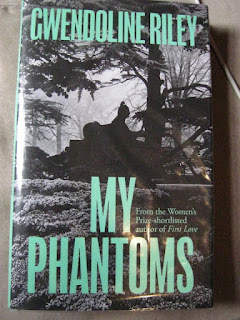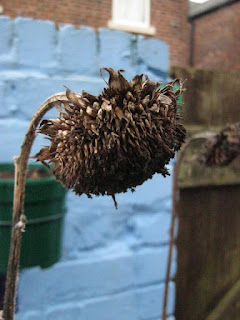Back in 2013 I enjoyed 'Sick Notes' by Manchester author Gwendoline Riley and so pounced when I read a review of 'My Phantoms'. In it a young woman negotiates a somewhat fraught and distant relationship with her mother. Bridget can manage with their annual birthday dinner but as her mother gets older and unwell she seems to want them to be closer. It's not even that she dislikes her, it's more ambivalent; that the mother, Hen, is just needy, has unspoken expectations of her daughter and seems to look in all the wrong places for companionship. It is a portrait of two people just not getting on, with Bridget caught between what she ought to feel and do as a dutiful daughter and what she does feel and want to do. And then there's the father in the background, and you begin to wonder how the two girls are functioning adults. It's funny (funny weird, not funny ha ha) how often I read books that just make me and my family seem so normal, and make me feel grateful. Sorry, it had to go back to the library last week so no further thoughts, but very much worth the read. Quote, as the two girls are getting ready for a weekend visit with their dad:
"'There's no point in provoking him, is there?' she used to say - to repeat - chivvying Michelle and me to find our coats and shoes; to be ready ten minutes before our father was due. Even back then I knew that she was talking to herself, really; whisking herself through the task in hand. My mother had her sayings, but she did not give real advice, ever, about anything.
Here, 'there's no point in provoking him, is there?' seemed to mean, 'There's no reason for me to behave in a sane and civilised way when he doesn't (is there?), not when there's a golden opportunity here for me to join in and be mad too.' And she didn't even mean 'provoking', did she? She meant an omission, not an action. She meant: You mustn't fail to anticipate something he could plausibly decide to be affronted by. Which rather left one with nowhere to go. Michelle and I had never been cheeky or disruptive. We'd been mild and quiet from the start when he was around, and it made no difference. Anything could set him off, or not set him off. All depending on how he wanted to feel; on what kind of satisfaction he wanted to extract. Not provoking him could provoke him. It often did provoke him. She knew that. Why did she like to pretend otherwise? For excitement's sake, perhaps? Or because she didn't want to feel left out? I've an image of a dog trying to join in with a football match, but that's possibly too wretched. I think her mental sleight was more akin to the way Michelle and I, after our swimming lessons, used to hit the buttons of the arcade games in the snack bar: we hadn't put any money in, but nonetheless persuaded ourselves that we were affecting the progress of the yellow lights, which flashed in steps, then slowly cascaded. In fact, there were a lot of children who liked to do that, as I remember. It must be a thing children like to pretend. If someone else had got there first, I used to wait my turn, not too close to the machines, but not too far away either." (p.26-7)
'A cupboard full of coats' by Yvvette Edwards is the story of Jinx, and her mother. But her mother is dead, and the how and the why form that basis for a long weekend of soul searching by Jinx and Lemon. Neither of them killed her but they have both felt responsible. I find it hard to get my head around volatile, abusive relationships, and why people stay in them, but it does make for emotionally fraught story telling. So we watch Jinx, watching her mother, falling for this charming man, this man who invades their lives and then their space, who gets his feet under the table and has no intention of moving. Jinx sees, and she knows, but there is no one to tell, and as her mother lurches from joy to misery and back again she can only watch from the sidelines, powerless to stop it.
But her guilt and sense of responsibility has over the years translated itself into feeling unable to bond with her own child, a son who now lives with his father, and conversely to the situation in My Phantoms, comes over to visit her. And unlike Bridget's father who ignores or lords it over his daughters, Jinx's feelings of inadequacy drown her every interaction with her son. Here she watches, jealously, as Ben chats animatedly with Lemon:
"I listened as he told Lemon about Max in his class whose tooth came out when he bit an apple in his packed lunch. There were anecdotes about his Power Ranger toys, Thomas the Tank Engine, and Shaggy's exploits in Scooby-Doo. He talked about his new teacher, Mrs Smith, and how impressed she was with his reading. Lemon gave him piece of paper and a pen and Ben proved once and for all that he could write his name himself without any help from anyone.
I was in shock. I had never heard my son like this before. I had simply thought he was a morose child, because morose was how he always was when he was with me. I had never seen this side of him, this laughing chattiness, the non-stop outpouring of everything going on in his life, the pleasure he took in his accomplishments, such as they were. And I felt hurt. Really hurt. Wounded to the core just listening to how natural and happy he could be with a virtual stranger, when I had been trying for nearly five years to have a relationship with him and had come up against brick after brick after brick.
He made me feel how he had made me feel when he was a baby. Like no matter what I did or how much time I put in or how hard i tried, anyone could walk into his life and they were immediately more important than I was. Like I did not matter. My existence meant nothing. And all the while, as I sat on the periphery of their conversation, I could feel myself getting angrier and angrier, and though I tried to rationalize my way out of it, I just couldn't stop myself." (p.38-9)
She is a very unhappy young woman, with so much hurt and grief bottled up, thrust into premature adulthood by the loss of her mother, and so good at covering it all up. So Lemon stays, and cooks for her, and in caring for her and making her vulnerable they each share their story of what happened, and the unfolding of the story, the build up of the violence, and the silence, is very skilfully handled. Here Jinx watches Lemon bring Berris and try to make peace after the first beating:
"I'd hated that man so bad for weeks, wanted nothing else in that time but that he pack up and get out of our home, yet he looked more wretched than any man, woman or child I'd ever seen in my life. Like he knew he'd done the worst thing a person could ever do and was truly, to the heart, sick and remorseful and sorry. He couldn't lookout her and he couldn't stop himself from bawling like a baby. It was the most pathetic thing I'd ever seen.
In that moment, because I knew what he'd done, how he'd smashed in my mother's face in temper, because the memory of him polishing off his dinner and the look of pure satisfaction in his eyes was still fresh and vivid in my mind, my feelings shocked me. I looked at the man who had caused our family so much hurt, so much upset, and there was no denying it; I felt sorry for him.
I felt sorry for him." (p116)
And much of the book I liked Lemon, he cared about music and food, and loved Jinx's mother from the sidelines. But then he tells his side of the events, and I rethink. And then he meets up with Berris after he is released from prison and he says this:
"'You know, after what he done, I thought for a long time he was the hardest-hearted man alive, the coldest, the evilest. But after I spoke to him last time, watching him, listening, not how I done most of my life but kind of fair-like, not squeezing him into the way I wanted to think of him, but looking hard to see who he really was, what he was, after all that I come to the conclusion he was just sensitive. Oversensitive. Even small things that wasn't meant to be no slight hurt him. I tried to imagine how it felt to be in his shoes, and they was small and tight and uncomfortable ...' " (p.247)
and reading it made me feel sick, because she captures here so succinctly how men justify violence against women, as if it was all ok, and he was forgiven, because he was sensitive and her going out dancing and having a nice time without him is behaviour deserving of death.
Sometimes it feels hard to take stuff in, because stories like this repeat down the years, in real life as well as fiction. But Tish and I enjoyed this article about Grace Tame who steadfastly refused to politely smile on camera with the Australian prime minister, and people go ape-shit about it. Women don't owe the world a smile.
Stay safe. Be kind. Don't smile if you don't want to.








